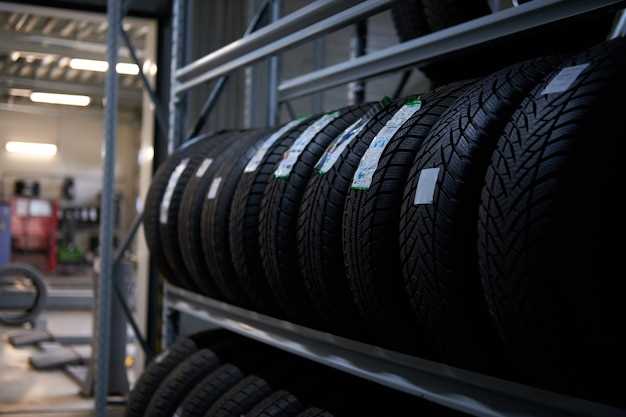
Choosing the right tires for your vehicle
- Dominique Kaye
- 0
- Posted on

Choosing the right tires for your vehicle is a critical decision that can significantly impact your driving experience, safety, and overall vehicle performance. With numerous options available on the market, understanding the key factors that influence your choice is essential. Tires are not just rubber components; they are intricately designed to affect handling, fuel efficiency, and comfort.
To make an informed choice, consider various aspects such as your driving style, the typical conditions in which you drive, and the specifications recommended by your vehicle manufacturer. Each type of tire–whether all-season, winter, or performance–offers distinct advantages tailored to specific driving environments. Evaluating these factors will help you find the tire that best meets your needs.
Additionally, paying attention to tire ratings, tread design, and warranty information can further guide your selection process. A public review of user experiences can provide valuable insights into the durability and performance of different tire brands and models. Ultimately, the right tire can enhance your vehicle’s handling and prolong its lifespan, making it a vital investment for any car owner.
Evaluating Tire Specifications for Your Driving Needs
Selecting the right tires for your vehicle involves a thorough understanding of tire specifications that match your driving conditions and preferences. When evaluating tire specifications, consider the following key factors:
- Tread Pattern: The tread design plays a crucial role in determining tire performance. All-season tires usually feature a symmetrical tread pattern that offers a balance of traction and longevity. If you live in an area with diverse weather conditions, all-season tires may be the best choice.
- Load Index: This numerical code indicates the maximum load a tire can safely carry. It is essential to choose a tire with an appropriate load index that matches your vehicle’s requirements.
- Speed Rating: The speed rating reflects the maximum speed capability of the tire. Choosing a tire with a sufficient speed rating is vital for ensuring safety and performance during driving.
- Tread Wear Rating: This rating gives an estimate of the tire’s lifespan. A higher rating suggests better durability and resistance to wear, influencing your long-term cost savings.
- Seasonal Performance: While all-season tires provide versatility, specific conditions require specialized tires. Assess your typical driving environment–whether it’s wet, snowy, or dry–to make an informed choice. Winter tires offer superior grip in snowy conditions, whereas summer tires enhance performance in warm weather.
Before making a purchase, it’s advisable to review your driving habits and the climate in your area. Understanding these specifications ensures that you choose the best tires tailored to your unique driving needs, thereby enhancing safety and performance on the road.
Understanding Weather and Terrain Impact on Tire Selection

When it comes to making an informed tire choice, it’s essential to consider how weather conditions and terrain type affect tire performance. Different environments demand specific tire characteristics to ensure safety, efficiency, and longevity.
In wet or rainy climates, tires must offer superior grip to prevent hydroplaning. All-season tires often provide a balanced solution, but dedicated rain tires can enhance traction on slippery roads. The tread pattern plays a pivotal role; deeper grooves help channel water away from the contact surface, enhancing wet weather performance.
In contrast, winter conditions require tires designed specifically for snow and ice. Winter tires feature softer rubber compounds that remain pliable in low temperatures. Additionally, their unique tread patterns enhance grip on slick surfaces, making them essential for safe driving in cold weather.
For off-road enthusiasts, the terrain significantly influences tire choice. Trail tires, for example, are designed with aggressive treads to navigate through mud, rocks, and sand. Their robust construction protects against punctures while offering the traction necessary for uneven surfaces.
Understanding your typical driving environment is crucial. If you frequently drive on highways, a tire with a smoother tread may provide a quieter ride and better fuel efficiency. Conversely, if you tackle rugged paths regularly, prioritize tires that offer durability and traction. By recognizing the impact of weather and terrain on tire selection, you can make a choice that enhances both performance and safety.
Assessing Cost vs. Performance in All-Season Tires

When selecting all-season tires, understanding the balance between cost and performance is critical. All-season tires are designed to provide a versatile driving experience across various weather conditions, but this versatility often comes with a range of pricing options. Evaluating your specific needs can help refine your choice.
Higher-priced tires typically offer advanced technology, improved tread patterns, and higher quality materials. These features can enhance grip, reduce road noise, and extend tire life. If you frequently drive in diverse weather conditions or cover long distances, investing in premium all-season tires may be justified due to their enhanced performance.
Conversely, budget-friendly options may perform adequately for casual driving and in milder climates. However, these tires might sacrifice durability and performance in extreme conditions. It’s crucial to consider how often you encounter rain, snow, or rough terrain. For occasional use or light driving, more affordable tires can be a sensible choice.
To assess this balance effectively, prioritize your typical driving conditions, frequency of travel, and personal budget. Researching customer reviews and expert ratings can provide valuable insights into the real-world performance of various tire brands and models. This knowledge will empower you to make a well-informed choice that aligns cost with performance, ensuring safety and satisfaction on the road.
